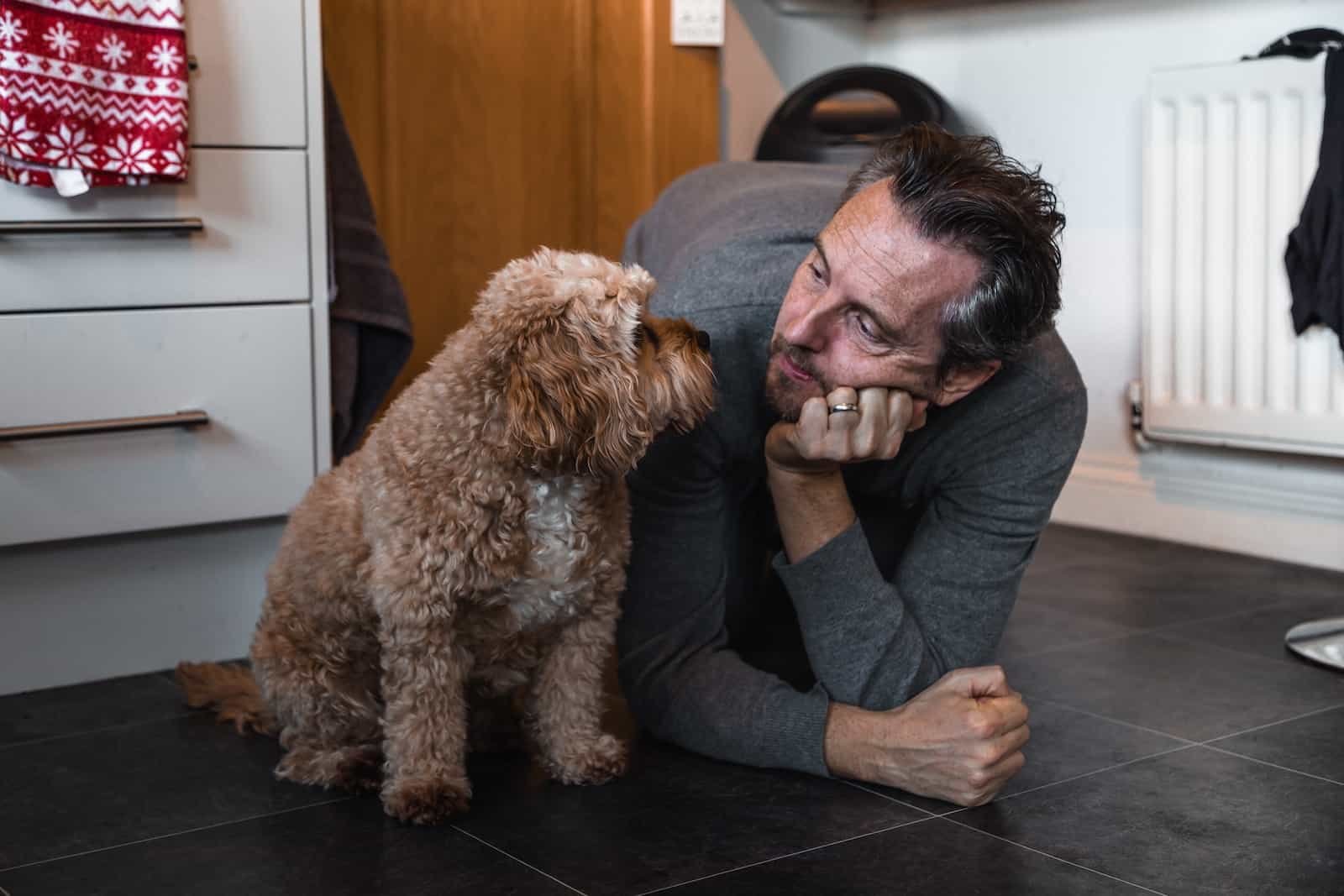
When owning a Poodle, or any dog breed for the matter, one of the things you’ll be thinking about is your pup’s lifespan. How long does Poodle live anyway? And what are the factors that affect your Poodle’s lifespan?
This article will tackle what you should know about the Poodle’s lifespan and share tips on keeping your Poodle healthy for years.
What is a Poodle’s Normal Life Span?
A Poodle’s life can be short-lived if they have a poor quality of life or unexpected accidents and diseases. Other times, they can live for up to 18 years old! The numbers would vary a bit, with some factors to consider.
One of the determining factors of a Poodle’s lifespan is its size. As we all know, there are three kinds of Poodle sizes, and usually, the smaller the dog breed, the longer the lifespan. Take a look at the different Poodle sizes and normal life spans:
Standard Poodle Lifespan
The Standard Poodle stands tall and is over 15 inches tall, and weighs up to 70 pounds. With their size, their average life expectancy is about 12 years. However, some Standard Poodles might pass as young as ten years, while others live up to 14 years old. Their lifespan can range between 12-15 years.
The Standard Poodle’s leading causes of death include gastrointestinal failure, cancer, and trauma.
Miniature Poodle Lifespan
Miniature Poodles fall in the middle category of Poodles, around 11-15 inches and weighing between 15-17 pounds. Being slightly smaller than Standard Poodles, they have an average lifespan of 15 years, though the lifespan ranges between 14-16 years.
The Miniature Poodle and Toy Poodle’s leading causes of death include neurological failure, cancer, and trauma.
Toy Poodle Lifespan
Toy Poodles are the smallest among the rest under 10 inches tall and weigh between 4-6 pounds. One of the smallest dog breeds has its perks, as they have an average life span of 16 years or between 14-18 years.
As long as you care for your Poodle well and take him to his routine checkups, then there’s an even higher chance that he can live a long and happy life.
You’re probably wondering: What does size have to do with a Poodle’s lifespan?
Statistics prove that size affects life span theory, with animal biologists and specialists taking a closer look to explain it further. Though this wasn’t the case, people believed that larger dogs’ bodies (like the Standard Poodle) had more work to do.
Researchers in Germany concluded that larger breeds had longer life expectancies after collecting data from more than 56,000 dogs, but they also age at accelerated paces. That means diseases can occur in larger dogs faster than smaller dogs are vulnerable.
For instance, musculoskeletal and gastrointestinal issues tend to affect a Standard Poodle quicker than it would a Toy Poodle. That said, there are a lot of exceptions, and researchers are still doing further studies on this!
What Affects Poodle Lifespan?
Besides the Poodle’s size, other factors can make his overall lifespan longer (or shorter). Poodles may also have genetic diseases they carry from their parents or are common in the breed itself. These are what to look out for:
Health Issues
As mentioned, Poodles may experience health issues that are genetic to them from their parents or the breed itself. It happens. Fortunately, vets can treat or prevent a lot of these diseases early on when detected immediately.
These are the most common ailments that Poodles may face:
- Addison’s disease (hypoadrenocorticism) refers to low hormone levels from the adrenal gland, which causes loss of appetite, weight loss, vomiting, and lethargy.
- Cushing’s disease (hyperadrenocorticism) is the exact opposite of Addison’s disease. It means your Poodle produces too many adrenal hormones, which causes increased appetite and thirst, skin problems, and boat.
- Sebaceous adenitis is more common in Standard Poodles. That is a hereditary skin condition that would cause hair loss, infections, lesions, and scaling.
- Skin Tumors refer to abnormal cell growth on the Poodle’s skins.
- Bladder Stones, which are very uncomfortable for Toy Poodles
- Tracheal Collapse, which occurs due to the weakening of cartilage rings of windpipes. It’s more common in Toy Poodles.
- Cataracts happen when the eyeball lenses start getting cloudy.
- Gastric dilation, also known as bloat, is common in Standard Poodles.
- Cancer is common not only in Poodles but other dog breeds as well when they become seniors.
- Luxating patella refers to the dislocation of one’s kneecap caused by inherited bone abnormalities.
- Legg-Calve-Perthes is the necrosis of the femoral head due to lack of blood supply to bones.
- Hip dysplasia is an abnormality in the thigh bone, or femur, as it doesn’t fit with the pelvis.
- They are also prone to thyroid issues, inflammatory bowel disease, epilepsy, cardiovascular disease, and juvenile renal disease.
That sounds like a long list, but it doesn’t mean your Poodle can get all these diseases at once. Furthermore, as long as you get an early health screening and care for your Poodle excellently, it can live a healthy life free from such diseases.
Trauma
As mentioned above, one of the leading causes of death among all Poodle varieties is trauma. Trauma refers to fatal injuries to the body, such as extremity, chest, or abdominal trauma, along with polytrauma. There are three ways a Poodle may experience fatal trauma:
- Blunt force trauma – Meaning a non-penetrating injury from impact. In many cases, dogs experience this after being hit by a car. Other times, they may fall staircases, off decks, from moving cars, and the like.
- Accidental trauma – Unfortunately, Toy Poodles are more susceptible to unintentional trauma by humans because of their tiny size. Some Poodles can get stepped on, dropped, and sat on at times. That’s why Toy Poodles aren’t the best for children who like to play rough.
- Physical attacks – Poodles can receive fatal injuries from abusive humans or when attacked by other animals.
How to Help Keep Your Poodle Healthy and Live Long
The Poodle’s quality of life will also make or break his overall health. Not only is his physical health important, but his mental and emotional wellbeing, too. That said, here are excellent tips on how to care for your Poodle and have him live longer and happily:
How to Prevent Accidents and Diseases
Having your dog vaccinated and taking him to the veterinarian for routine checkups are the best ways to prevent diseases. If the veterinarian does detect infection during one of the checkups, he may quickly treat it for early intervention and cure.
Besides preventing diseases, it’s essential to avoid accidents and trauma. Since trauma is the Poodle’s leading cause of death, it’s crucial to prevent it from happening in the first place. Follow these tips:
- Any time your Poodle is outside, he must wear a leash with someone supervising him. There are no exceptions to that rule. Furthermore, when your Poodle is out in the yard, all fences and gates must be closed and secure to prevent him from trying to escape.
- Everyone in the household, especially the young ones, should adequately handle a dog, especially the tiny Toy Poodle. No one should play too rough with the pet or try hurting it!
- Always stay aware and keep your Poodle out of harm’s way by dog-proofing your home. Also, you have to be wary as you walk your dog, as he can swiftly move and run to other areas when distracted, which can end up in accidents.
- Prevent poisoning by training your dog not to chew on furniture or foreign objects. Monitor what your Poodle chews and introduce him to safe toys he can use to relieve his teeth!
Regular Health Testing
Unfortunately, people would only bring their pets to the vet when there’s a severe issue. That may cause an early death because the problem wasn’t caught during the early stages when medical intervention could have saved a life.
Other times, people wouldn’t take their pets to the vet because they aren’t sure whether their dog feels sick or injured. That shouldn’t be the case, and numerous owners must treat their Poodle as a family member, meaning they need routine checkups, too.
Arrange for yearly veterinarian visits and remember the follow-up visits as needed. Be observant with your Poodle and contact your vet if you notice something suspicious, rather than ignore it.
It might sound expensive, which is why pet insurance sounds like an excellent investment!
You might also want to consider genetic health testing to prepare yourself for what your Poodle may have in the future. That way, you can take preventative measures and treat any diseases he may have as early as possible.
Spay or Neuter
There is still some debate about spaying and neutering, but such procedures can eliminate the risk of female dogs developing ovarian and breast cancer. It can also eliminate the risk of males developing testicular cancer.
Studies show that spayed or neutered dogs lived up to 23% longer than unfixed counterparts! Check with the veterinarian and consult him on when your Poodle should go through spaying or neutering, especially if you don’t plan on breeding them.
Regular Exercise
Well-exercised Poodles are healthy Poodles! If you’re unfamiliar with the Poodle, they are incredibly athletic dogs with high energy levels and love to play.
Like all dog breeds, they aren’t meant to live sedentary lives and require moderate exercise daily. Avoid excessive exercise or overworking your dog in hot weather, though, as this would harm them in the long run. Toy Poodles, in particular, will require less strenuous exercise, so avoid having them jump from heights or overexercise their short legs!
Regular exercise has numerous physical health benefits, as it can help prevent the following:
- Stroke
- Heart disease
- Arthritis
- Obesity
- Certain types of cancer
Furthermore, regular exercise will help a dog’s mental health, too! Their emotional wellbeing benefits from exercise through:
- Releasing pent up energy for a more relaxed and happier dog after exercise or training
- Exercise can strengthen the bond between you and your Poodle. Poodles will appreciate all the time and attention their owners give them, and they’ll feel more at ease being with you.
- Take advantage of long walks to incorporate socialization training and instill commands for better behavior traits.
- Mental exercise can also give your Poodle the avenue to relieve any stress or frustration.
High-Quality Diet and Clean Water
Just like us humans, Poodles won’t stay healthy consuming poor-quality food and junk! You might feel surprised when you see how unhealthy cheap commercial dog food can get.
You get what you purchase, and with cheap dog food, you get fillers, artificial flavors, and artificial coloring, as well as unhealthy preservatives. Such food might even have non-meat parts from pigs, sheep, chickens, and cattle, such as the lungs, diseased livers, tumors, or udders. At times, very cheap dog food might come from dead animals or “downers,” which are animals deemed too injured or ill for humans to slaughter for consumption.
Even well-known brands may have legal levels of contaminants that might not do much harm when consumed within the day, week, or month. But that can still build up over time and affect your Poodle’s lifespan.
Because of that, you must choose premium dog food from reputable brands known for their high-quality ingredients. You can check with the veterinarian for any recommendations and ask if you need to give your Poodle a complete vitamin and mineral supplement daily.
Never feed your Poodle human food and learn about the human foods your dog should never eat. Additionally, be mindful of the number of treats you give your dog to prevent obesity, and ensure he stays away from cooked bones, rawhides, and deer antlers, as they can pose a choking risk.
Besides food, ensure that your Poodle stays hydrated by providing him fresh and clean water. Prevent any contamination by replacing the water every few hours and using filtered water rather than kitchen tap water. Furthermore, wash your dog’s water bowl daily.
Regular Grooming
Infection is also a cause of sickness and death in Standard Poodles. Prevent infections and matting by regularly grooming your pet.
Brush your Poodle every day and bathe him every 4-6 weeks using premium dog shampoo and conditioner suitable for his coat. You must also clean his ears and brush his teeth 2-3 times a week, taking proper care to prevent ear infections or dental disease.
As you brush and bathe your Poodle, it’s a chance to examine his skin and coat for any suspicious ticks, infections, lumps, and whatnot.






